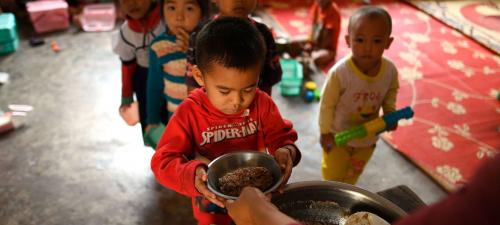Over 820 million people suffering from hunger; new UN report reveals stubborn realities of ‘immense’ global challenge
After nearly a decade of progress, the number of people who suffer from hunger has slowly increased over the past three years, with about one in every nine people globally suffering from hunger today, the United Nations said in a new report released on Monday.

Local school children eat their meals at the Ban Bor Primary School in Xay District, Lao People's Democratic Republic.
This fact underscores “the immense challenge” to achieving the Zero Hunger target of the Sustainable Development Goals (SDGs) by 2030, according to the State of Food Security and Nutrition in the World 2019.
The report, launched on the margins of the High-level Political Forum (HLPF) – the main UN platform monitoring follow-up on States’ actions on the SDGs – currently under way in New York, breaks down statistics by region, and shows that hunger has risen almost 20 per cent in Africa’s subregions, areas which also have the greatest prevalence of undernourishment.
Although the pervasiveness of hunger in Latin America and the Caribbean is still below seven per cent, it is slowly increasing. And in Asia, undernourishment affects 11 per cent of the population. Although southern Asia saw great progress over the last five years, at almost 15 per cent, it is still the subregion with the highest prevalence of undernourishment.
To safeguard food security and nutrition, the 2019 report stresses the importance to economic and social policies to counteract the effects of adverse economic cycles when they arrive, while avoiding cuts in essential services.
It maintains that the uneven pace of economic recovery “is undermining efforts to end hunger and malnutrition, with hunger increasing in many countries where the economy has slowed down or contracted”, mostly in middle-income nations.
Moreover, economic slowdowns or downturns disproportionally undermine food security and nutrition where inequalities are greater.
“Income inequality increases the likelihood of severe food insecurity, and this effect is 20 per cent higher for low-income countries compared with middle-income countries”, the report spells out.
The report concludes with guidance on what short- and long-term policies must be undertaken to safeguard food security and nutrition during episodes of economic turmoil or in preparation for them, such as integrating food security and nutrition concerns into poverty reduction efforts using pro-poor and inclusive structural transformations.
Source:UN
- 327 reads
Human Rights
Ringing FOWPAL’s Peace Bell for the World:Nobel Peace Prize Laureates’ Visions and Actions

Protecting the World’s Cultural Diversity for a Sustainable Future

The Peace Bell Resonates at the 27th Eurasian Economic Summit

Declaration of World Day of the Power of Hope Endorsed by People in 158 Nations

Puppet Show I International Friendship Day 2020

